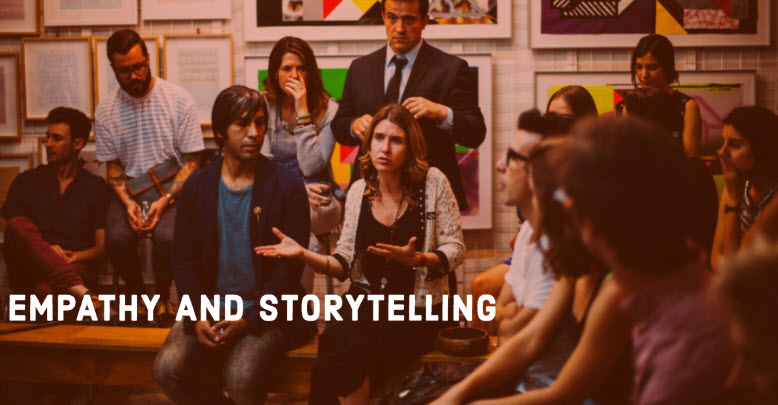Red Daisies: Applied Improv for Acquired Brain Injuries
We always say that the tools you learn in Improv For Therapists can be used to help clients, but it’s always amazing to learn about it actually happening. One therapist, who just took our Improv For Therapists Level One class, has already started implementing what they learned in their work. They are a Community Support Worker who helps people with acquired brain injuries, and this particular story centers around…
Yes, and…. Improv Can Be Therapeutic
by Lindsey Phillips (originally published in Counseling Today) Two of the main rules of improv are that you must agree with the other person and add to the conversation. One of the most commonly used improv games “Yes, and …” illustrates these principles. Two people face each other. One person starts by voicing a single statement. The other person accepts this idea and builds on it by responding, “Yes, and …” For example,…
How Making Things Up Together Helps Us Deal With Reality
Jude Treder-Wolff (judetrederwolff) LCSW, CGP, MT & Certified Practitioner of Applied Improvisation, consultant/trainer and writer/performer. www.lifestage.org, www.mostlytruethings.com Resilience is a strength which, when we face a difficult reality that stretches our capacity to cope, doesn’t go away. It provides a kind of emotional and cognitive elasticity we need to reimagine our lives when they are turned upside-down. Improv is an ideal playground for developing this elasticity. From the very start of…
Its Not Magic: How “Heroic Improv” Training Can Bring Out Our Best At The Worst Of Times
Jude Treder-Wolff (judetrederwolff) LCSW, CGP, MT & Certified Practitioner of Applied Improvisation, consultant/trainer and writer/performer. www.lifestage.org, www.mostlytruethings.com There are real-life, high-stakes situations in which moment-to-moment choices can have life or death consequences, specifically “no-notice” events like natural disasters, or shootings, which are, sadly, increasingly a possibility anyone might have to deal with in a public space. These situations call for the ability to prioritize and problem-solve under pressure and connect rapidly with other…
Rx Improv: How Group Creative Experiences Boost Mental Health
Jude Treder-Wolff (judetrederwolff) LCSW, CGP, MT & Certified Practitioner of Applied Improvisation, consultant/trainer and writer/performer. www.lifestage.org, www.mostlytruethings.com After a difficult year of separation from loved ones due to the pandemic, ongoing uncertainty about our health and safety, and the pressures of negotiating the post-pandemic social environment we need to do all we can to build each other up and maintain mental health. Improv can be a non-medical, unconventional resource that can…
Improv in the Third Act
“You can’t help growing older, but you don’t have to grow old.” George Burns Almost a decade ago, my family sat in the hospital waiting room, waiting to hear the outcome of the surgery I was undergoing to repair the damage caused by a sudden cerebral aneurysm. My surgeons appeared with the good and the bad news for my family. I had survived the surgery, but my surgeon warned, it…
Life is a gift, and I am filled with gratitude
I ask myself the same essential question that my clients pose in my office every day without exception. How do I find happiness and live a normal, decent life in the face of the personal trials all families encounter? My answer is fundamental to my way of life and the foundation of my practice. I am grateful for all that is good in my life. I am mindful to expand my…
How improv offers me relief from Obsessive Compulsive Disorder (OCD)
The other day I left my house with a feeling of ease and relaxation. Clearly, something must be wrong!! You see, I usually leave after mentally prying myself from a series of repetitive rituals such as checking the kitchen appliances, the faucets, and that the front door knob is locked (20 times). I have learned to do this discreetly, especially in front of my husband and children. Even after I…
Recovering from Control Issues and Learning to Trust the Process
“Trust the Process.” I was frustrated when Lisa said that to me. We were leading an improv group in a treatment setting and I was annoyed that people were not following the rules of the game. I leaned over to Lisa and whispered, “That is not what you told them to do. They are not doing it right.” Lisa gave me a sweet dimpled smile and said, “Trust the process.” …
Recovering from Perfectionism and Learning to Fall Forward
“Stop trying to be so perfect.” That was the first piece of feedback I received in improv class, and it hit me deep in my soul. I remember nodding while I replied to my teacher, “That seems like a timely piece of life advice.” Recovering from perfectionism has been a forefront theme in my life since that moment. I believe the origins stem from an achievement focused childhood, like “perfect…
Pass the ball, I’m not afraid to fail
There is an improv game we play with adults at recovery treatment centers. The exercise calls for someone to start with an imaginary ball of energy. The first person is holding the ball, moving it around with their hands and describing what it is. “I’m holding a beach ball,” says the first player. After pretending to bounce it a few times, they toss the ball to another player in the…
Characters Building Character
Comedic Improvisers are known for their ability to create absurd and wacky characters, often including funny voices or strange physicalities. These performances are entertaining, as the characters might remind us of people we know, or are simply so outlandish we cannot help but laugh. In Improv Therapy, character work is a difficult skill that is often saved for more experienced groups. But encouraging patients to experiment with taking on heightened…
Radical Acceptance: What Makes Improv Therapeutic
In the past decade the field of Improv Therapy has slowly crept its way into psychological scholarship. Frontiers in Psychology and the Journal of Mental Health published articles in 2013 and 2017 respectively outlining the potential therapeutic benefits of comedic improvisation. Around the country professionals ranging from neuropsychologists to therapists to life coaches and wellness experts are incorporating improv techniques into their work. As such improv is currently being used…
“Is he allowed to do that?” – Improv gives us a rare environment where there are no wrong answers
Before an idea is a good idea or a bad idea, it is a new idea. To write a book, start a business or simply change up a go-to dinner recipe, we have to test out a new idea. But with every new idea put into action we take a risk; many businesses don’t succeed and sometimes the new ingredient we try out ruins the dish. For so many of…
Empathy and Storytelling
Improv is often explained as theater that you “make up on the fly.” Indeed, improvisational theater in a performance setting features entire stories and characters invented on the spot entirely from imagination. But improv in a therapeutic setting is deeply rooted in exploring personal stories through drama, and thus requires us to be able to share such stories. Telling personal stories in a group setting fosters empathy between the group…
Child’s Play: Life conditions us not to be silly – Improv reteaches us how
Lisa cupped her hands in the air as though she were holding a baseball. She explained to the group that she was holding an invisible ball of energy which she passed along to the people sitting around the circle. Each individual could mime an action with the invisible ball (dribbling, juggling, etc.) before passing it along. It is one of the simpler improv warm ups, but to most adults the…
7 Ways to Practice Self-Care and Prevent Stress from Taking Over Your Life
When the workload piles up, it’s easy to get buried in it and let the ensuing stress control your life. Spending after-hours answering emails or leaping from one task to the next may feel productive, but actually only increases your anxiety even more. Give yourself a well-earned break and try these self-care tips. Make Your Home More Serene Just like it takes up space in the house, clutter can overwhelm…
Optimizing Empathy: Being empathic doesn’t require giving someone advice to solve their problem.
I was sitting on my therapist’s couch, gazing through the partially opened blinds of his office’s floor to ceiling window, while he talked me through a simple gym couple scenario. “Have you ever seen that couple at the gym, where the guy is ridiculing his girlfriend about how her stomach isn’t flat enough or her butt is too small, and she works that much harder during their workout trying to…
Using Improv to Become a Self-Advocate
Being a self-advocate is all about speaking up for yourself so that you can live the best life you can. Improv can be utilized for self-advocacy skills by assisting in confidence and public speaking, as well as communication, on-the-spot thinking and decision-making. The University of Montana’s Research and Training Center on Disability in Rural Communities has a toolkit that uses improv to help build self-advocacy skills in Independent Living leaders…
Articulation (Do you Know What I Mean??)
Being sufficiently articulate can greatly help you on the path of life. By being able to articulate your thoughts and feelings on any given situation, you are able to live your life to its fullest potential and have more meaningful experiences. You are also better able to understand and absorb the world around you, through the method of processing your experiences into cohesive words and phrases. Improv teaches articulation by…
Improv is just fun!
Many have asked the question: why should we learn improv? And many, including myself, have answered with things like it’s good for education, useful in traveling, it’s therapeutic, etc. All of those reasons are true and fine, but there can be a much simpler, yet no less valid, answer as well. Improv is fun! Many people seem to be under the impression that in order to do something, one must…
Improv in Schools – Improv for Students
There are so many articles and studies about how teachers can use improv in the classroom to help their students, but there aren’t many discussions on how students can use improv training to help further their own education. Improv can be used in everyday class life ranging from elementary school, all the way up to university. There are many types of class activities and projects that appear frequently throughout all…
Improv and Traveling
Some people don’t travel because they’re scared of the unknown. With improv training, it is easier to face the unknown and have an awesome time doing it! That’s why improv can be a great help with traveling. The first integral part of any traveling experience is figuring out what you’re going to do, whether this be planned months in advance or on the day of. The improv skill that comes…
Benefits of Teaching Children Improv
A vital part of a healthy childhood is playtime, in which children band together to create a game, a scene, or even a whole imaginary world. Improv training from a young age can not only assist in the creativity involved in imaginative play, but it can also help to shape children into more confident and witty adults. They will become quick thinkers and more articulate speakers, more mature and respectful…
Improv and the Art of Getting Hired
You may have memorized what your strengths and weaknesses are, a story about a time you handled a tough situation in the workplace, and a mistake you’ve made in the past that you’ve learned from. But when an employer asks you how your favorite animal represents your work approach, or what fictional character you think best matches your work ethic, what on earth are you supposed to say? The answer…
The Importance Of A Safe Group Space For Healing
Being social is a big part of being human. Throughout time, people around the world have seemed to inherently understand the importance of belonging to a community. Long ago, community was necessary for safety and survival, however now in modern society, community is more important for emotional survival. Research is showing that meaningful social interaction can improve health, just like attending individual therapy, eating a good diet, or exercising. Research…
Ways Improv Improves Your Everyday Life
Most people think improv is about performance – which makes sense because you do improvise in a group, sometimes in front of other people. But it’s clear that improv has many benefits not related to performing. Improv provides a necessary creative outlet, teaches give and take, and fosters a sense of community and friendship. Improv is very beneficial to every day life for people in varying states of mental and…
What Improv and Meditation Have In Common
Neuroplasticity is the scientific term for your brain’s flexibility or the brain’s ability to rewire itself. Our brains are constantly being shaped and reshaped by experiences, thoughts, and behaviors. The brain’s ability to evolve is amazing. It helps us develop from into adulthood and recover from injuries. But what happens when our brain becomes wired for something that isn’t particularly helpful, or is perhaps even damaging? Brain In Charge Just…
How Saying “Yes” in Improv Translates to Real Life Healing
For anyone that has never tried improv, the very idea can cause stress. Standing up in front of a crowd and being expected to speak sounds horrible – one would think. So, how is it possible that improv is becoming a recognized group therapy tool? The Research Scientists, researchers, and psychologists have been noticing the parallels between therapy and improv over the last few years. “Both improv and applied psychology…
Categories
- Advocacy (1)
- Articulate (2)
- From the Advisory Board (1)
- Improv (13)
- Improv and Children (6)
- Improv Exercises (28)
- Improv Life Lessons (23)
- Interviews (2)
- ITG Blog (29)
- ITG Games and Exercises (26)
- ITG Podcasts (3)
- Look Who Gets It (10)
- Meditation (1)
- Neuroplasticity (5)
- Self-Care (9)
- Storytelling (3)
- Teamwork (6)
- Therapy (5)
- Yes, and (13)


























